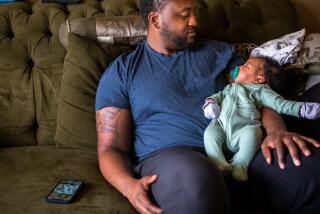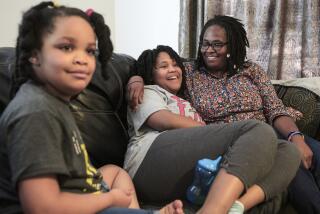Gentlemen, start your clocks
- Share via
THERE WAS some dark poetic justice to a study released this week finding that fathers over 40 were six times more likely to produce autistic children than fathers under 30. As grim a subject as autism can be, the idea that, for once, fathers rather than mothers are seen as responsible for abnormalities in children -- because of age, no less -- was nothing short of revelatory.
The research, led by the Mt. Sinai School of Medicine in New York and published Monday in the Archives of General Psychiatry, included nearly 379,000 children born in Israel in the 1980s. According to the study, children born to fathers ages 15 to 29 had an autism rate of six in every 10,000. For fathers 30 to 39, the rate was just slightly higher; nine out of 10,000. But in the sample of children born to fathers 40 to 49, the rate jumped nearly sixfold, with 32 in every 10,000 children eventually being diagnosed with autism.
The study noted that the mothers’ ages did not appear to be a factor. Moreover, it showed that for the older fathers, rates of autism were equally as high among girls as boys. Among the general population, boys are usually six times more likely to be afflicted. In cases of fathers over 40, the gender ratio for autism was even.
In other words, memo to the Tony Randalls of the world (he fathered a child at 77, remember?): You may think your biological clock can win a wrestling match against the hands of time, but the data suggest otherwise.
The real lesson behind this study may not be much different from that old maxim about having a child, which is that there’s never a right time to do it. Biologically speaking, we’re probably best off reproducing in our early 20s, but the economic and social realities of the last 30 years or so have more or less conspired to make that a pretty bad idea. Unless you happen to be Reese Witherspoon, young parenthood often correlates with higher rates of poverty -- not to mention disenfranchisement from the cultural phenomenon of child-as-middle-age-status-symbol. If “Mommy Wars”-type literary anthologies and blogs such as urbanbaby.com are any indication, parenthood is not for the young but for over-mortgaged elites who debate the merits of sign language for babies as though it were an international policy issue.
But what about the 30s? That’s no time to have kids either, especially if you’re a middle-class professional who feels compelled to put in 60 hours a week to gain the economic status increasingly necessary to support a family. In households in which both partners are working, changing diapers while trying to make law partner can quickly devolve into a situation resembling hell.
That leaves the 40s, which would be a fine time to start having kids if it weren’t for the fact that many women can’t get pregnant at that point -- at least not without the help of expensive reproductive technologies. Many men, of course, have been wise to this for years, often waiting until they’re prosperous and middle-aged to begin having children with the kind of younger women who either don’t want to make law partner or are willing to spend their husband’s money on nannies while forging their own corporate ascents.
But now that this autism study has thrown a wrench in that strategy, what’s a professionally ambitious, would-be dad to do?
Most of them, of course, probably won’t do anything at all. As interesting as scientific data can be, it usually doesn’t affect individual behavior. For all we now know about the causes of obesity and heart disease, most of us haven’t exactly given up the lard-based delights that compose much of the American diet. Besides, even if we know that delayed parenthood poses risks to children, a child born to parents who are too young for the job (and for some of us, “too young” extends well into our 30s) faces an entirely separate set of risks. Not only are they less likely to be learning baby sign language, they might not have a solid roof over their heads.
But for women, there’s still vindication in the idea of men sharing some of the burdens of biological clock anxieties. No, they don’t have to worry about their eggs petrifying, and no, there probably won’t be a rush on engagement rings in the wake of an autism scare. But it can’t hurt to remind men that they need to check their fertility watches occasionally too.
That is, as long as they don’t appear all desperate and baby hungry. Women can smell that a mile away, and it really freaks us out.







